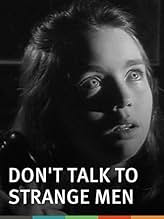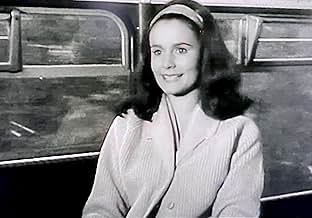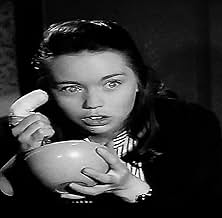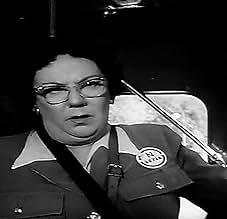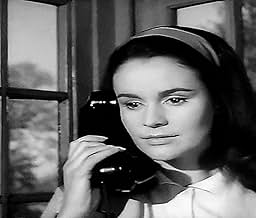An innocent girl is "groomed" over the telephone and nearly becomes the victim of the attacker, only to put her younger sister's life in grave danger.An innocent girl is "groomed" over the telephone and nearly becomes the victim of the attacker, only to put her younger sister's life in grave danger.An innocent girl is "groomed" over the telephone and nearly becomes the victim of the attacker, only to put her younger sister's life in grave danger.
Featured reviews
DON'T TALK TO STRANGE MEN is one of those intriguing, forgotten thrillers that's a great for fans of British cinema. It's about a lively and beautiful young girl who randomly answers a ringing public phone and soon finds herself entranced by the voice on the other end: the man sounds attractive and is willing to meet up with her. However, can he be trusted?
There were a few films with similar themes that came out around the same time (like Hammer's NEVER TAKE SWEETS FROM A STRANGER) and they do feel ahead of their time. The use of a telephone for sinister communication here brings to mind the later chills of BLACK Christmas and WHEN A STRANGER CALLS and of course the whole stalking-style plot line would eventually transform into the slasher genre of the 1980s.
DON'T TALK TO STRANGE MEN is quite a dated film, with a slow and sedate pace, and nothing much really happens until the very end. However, it's richly atmospheric and also quite realistic in the depiction of the average British family and their lives. It might not be the most entertaining film out there but it's a curio worth checking out nonetheless.
There were a few films with similar themes that came out around the same time (like Hammer's NEVER TAKE SWEETS FROM A STRANGER) and they do feel ahead of their time. The use of a telephone for sinister communication here brings to mind the later chills of BLACK Christmas and WHEN A STRANGER CALLS and of course the whole stalking-style plot line would eventually transform into the slasher genre of the 1980s.
DON'T TALK TO STRANGE MEN is quite a dated film, with a slow and sedate pace, and nothing much really happens until the very end. However, it's richly atmospheric and also quite realistic in the depiction of the average British family and their lives. It might not be the most entertaining film out there but it's a curio worth checking out nonetheless.
I do not remember if I first saw this at the local cinema or on TV,however I have always remembered this because of the isolated phone box.I have just seen this on TV and I have to say that it manages to sustain a genuinely creepy atmosphere throughout.It never puts a foot wrong.For one thing we never get to see the face of the murderer which helps make him see even more sinister.Conrad Phillips,who recently died,was the only well known face in this,apart of course from Dandy Nicholls,just a few years away from fame on TV.Difficult to believe that such a giant of the cinema,Jack Cardiff was Director of Photography on what was essentially a B film.
Christina Gregg is waiting for the bus to pick her up at the stop, when the phone rings in the telephone booth. That's all there is, besides her and the road and a few empty fields, so she picks up the phone and tells the cultured sound man on the other end that he has the wrong number. He thanks her, and admires her voice. They chat for a bit, and he asks if she will answer the phone if he calls the number at the same time tomorrow. She says she will. When she goes home, she high-hats her old, worn-out parents with her sophisticated secret admirer.
It's one of those middle-class "Your daughters are in danger!" thrillers that nowadays the Lifetime cable channel turns out by the score. This is very early in the evolution of the form, so there's lots to admire in early examples of what will become standard tropes while they are new and fresh. Miss Gregg is quite good. The overwhelming normality of everything and everyone about her, from her parents, who don't know what she is going on about, to bus conductress Dandy Nichols, to kid sister Janina Faye, who just wants her sister to go the movies with her, make this an early and effective example of the genre.
It's one of those middle-class "Your daughters are in danger!" thrillers that nowadays the Lifetime cable channel turns out by the score. This is very early in the evolution of the form, so there's lots to admire in early examples of what will become standard tropes while they are new and fresh. Miss Gregg is quite good. The overwhelming normality of everything and everyone about her, from her parents, who don't know what she is going on about, to bus conductress Dandy Nichols, to kid sister Janina Faye, who just wants her sister to go the movies with her, make this an early and effective example of the genre.
Released as the support feature to The Loneliness of the Long Distance Runner, Don't Talk to Strange Men is a very effective creeper that is worthy of a larger audience. Clocking in at just over an hour in running time, film thrives on tension building and mood without having to spill a drop of blood. Story effectively is about a teenage girl called Jean (Christina Gregg), who whilst waiting for her bus on a secluded country lane, answers the phone ringing at the phone box situated by the stop. The voice on the phone is a charming and well spoken man, he strikes up a conversation with the intrigued girl and it's not long before the two of them are arranging to speak to each other at the same time tomorrow, and the next day Jean begins fantasising about the man, conjuring up images of the perfect male. They are destined to meet up, does she not know these are dangerous times? Where young ladies fall prey to predatory monsters.
The settings are perfect, Jean and her family live in some idyllic country village, the phone box and bus stop that houses the verbal "grooming" is at the junction of two pretty country lanes, and even the pub where Jean goes to help out is the kind of petite "off the beaten track" variety. It's these locations that give off a false sense of security, a normality of easy going life where nothing can go wrong, But as we know all too well these days, nowhere is safe and parents constantly live in fear for their children. With that, Don't Talk to Strange Men is something of a film ahead of its time, substitute naive Jean's phone box "relationship" with that of today's Internet groomers of youngsters, and, well, you get my point I'm sure.
Neatly directed by Pat Jackson (The Feminine Touch), the film is structured in such a way that we the audience get fretful as each day, and each phone conversation, passes. Where once was this attractive young lady framed by countryside and the old fashioned value of the red phone box, now is replaced by surroundings that are too quiet and a big red beacon of impending doom! It's an astute turning of the table, a testament to good writing and excellent directional pacing. And how nice to report that the ending, too, has something up its sleeve to reveal. The cast is minimal but very effective, with Gregg doing well to convince us of her love yearning naivety, Dandy Nicholls (Hue & Cry) memorable (wasn't she always?) as the wise bus conductor and Janina Faye (The Horror of Dracula) stealing the film as Jean's younger, politico activist in waiting, sister.
A lesson in how to get the maximum unease from such a simple premise, Don't Talk to Strange Men comes highly recommended. 8/10
The settings are perfect, Jean and her family live in some idyllic country village, the phone box and bus stop that houses the verbal "grooming" is at the junction of two pretty country lanes, and even the pub where Jean goes to help out is the kind of petite "off the beaten track" variety. It's these locations that give off a false sense of security, a normality of easy going life where nothing can go wrong, But as we know all too well these days, nowhere is safe and parents constantly live in fear for their children. With that, Don't Talk to Strange Men is something of a film ahead of its time, substitute naive Jean's phone box "relationship" with that of today's Internet groomers of youngsters, and, well, you get my point I'm sure.
Neatly directed by Pat Jackson (The Feminine Touch), the film is structured in such a way that we the audience get fretful as each day, and each phone conversation, passes. Where once was this attractive young lady framed by countryside and the old fashioned value of the red phone box, now is replaced by surroundings that are too quiet and a big red beacon of impending doom! It's an astute turning of the table, a testament to good writing and excellent directional pacing. And how nice to report that the ending, too, has something up its sleeve to reveal. The cast is minimal but very effective, with Gregg doing well to convince us of her love yearning naivety, Dandy Nicholls (Hue & Cry) memorable (wasn't she always?) as the wise bus conductor and Janina Faye (The Horror of Dracula) stealing the film as Jean's younger, politico activist in waiting, sister.
A lesson in how to get the maximum unease from such a simple premise, Don't Talk to Strange Men comes highly recommended. 8/10
Absolute gem that apparently went out as a support to 'Loneliness of the Long distance Runner' upon release. In many ways an object lesson in how to make a movie. The performances are all good the cinematography (by Jack Cardiff) is excellent and the simple tale assuredly told thanks to a fine script. It is a tale of girls' vulnerability to 'strange men' or simply the male predator. This is all the more effective for its telling from the perspective of the two girls. Unlikely to be presented in this way today, we see the girls enthusiasm, their welcoming of the attention and in the case of the older girl, her sensing the transition to of her adulthood. Potent stuff indeed and made all the more chilling by completely believable dialogue on all sides, including the parents, and the stunning photography, particularly the night shots. Dandy Nichols is a welcome extra as the bus conductress, but this is a must see for all except those only fascinated by 'blockbusters'. Very redolent of the time but also, as others have pointed out, still pertinent today because of internet chat lines and the like.
Did you know
- TriviaThe scene where the girls talk near the cinema is shot in Beaconsfield New Town, Bucks, on the opposite side of the same road where, in Brief Encounter, Celia Johnson and Trevor Howard talk outside the newsagents WH Smith's. Cyril Raymond is in both films.
- GoofsConrad Phillips gives Christina Gregg library books to return, but she doesn't have them when she leaves the pub.
- ConnectionsReferenced in Lisa (1990)
Details
- Runtime
- 1h 5m(65 min)
- Color
- Aspect ratio
- 1.37 : 1
Contribute to this page
Suggest an edit or add missing content

